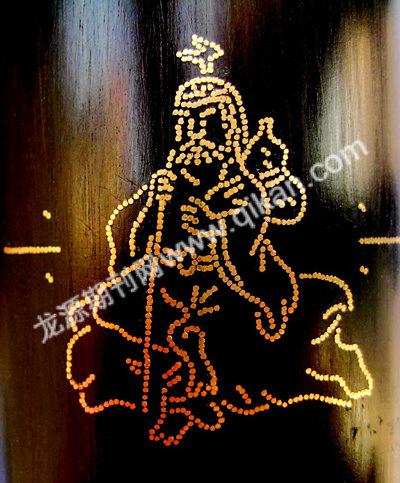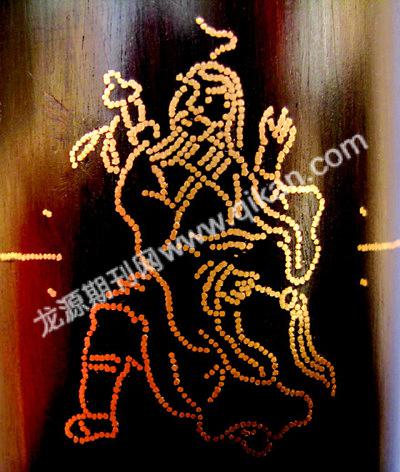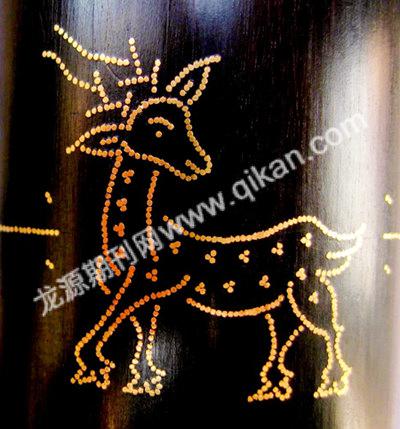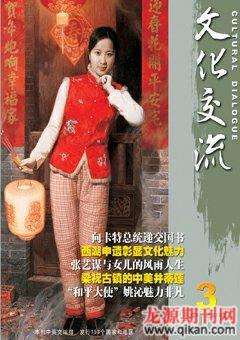Master of?。樱簦澹澹欤幔颍洌?/h1>
2009-06-30 09:39LuoHaiying
文化交流 2009年3期
Luo Haiying
Stepping into the showroom of Ying Deyin, a master manufacturer of steelyards, I was astonished at the sight of a huge steelyard. I had never seen such a huge steelyard. Although there were many other long steelyards on display in the studio, this particular ones size really staggered my imagination. It is 2.8 meters in length, the largest diameter of the arm being 6.5 centimeters, its net weight being 10.5 kg and the balancing weight 26.5 kg. The maximum weight that can be measured on this weighing instrument is 800 kg. It is said that this is the largest wood steelyard in the world.
I had long since known about Ying Deyins art of making traditional Chinese weighing instruments and his unique reputation as a prominent master in Yongkang, known as the Chinas powerhouse of weighing machines.
Ying Deyin was commissioned to make this wood steelyard in the first half of 2007. Except for specifying requirements for materials to be used and the steelyards length, the client asked Ying to use his imagination for making the steelyard as wonderful as possible.
It took Ying more than half a year to find a suitable timber for the weighing instrument. The dark red timber was imported from Myanmar. The materials were the least problems Ying must tackle.
He had never manufactured anything this huge. A wood weighing instrument requires that the arms be smooth, straight and round, calibration accurate, the pivoted bar easy to handle. What is more, decoration must display supreme design.
Ying decided to forgo arithmetic numbers for the calibration of this steelyard. Since the weighing instrument was commissioned to be a gift, rather than a real tool to measure weights, art should be of most significance. He designed 14 images to calibrate the steelyard: eight immortals in a Chinese legend and six auspicious animals.
Designing was not the most time-consuming part of the manufacture. It took him a day to complete an image with gold wires. Thirty grams of gold wire in total were used on the weighing instrument and it took the master four months to complete the whole wire imaging job. Altogether, it took the master nearly a year to make it.




I asked Ying how he hit upon the idea of making fourteen images as weight indicators on the arm. He explained that before the 1950s only really people such as landlords could afford to have such a steelyard as a symbol of wealth and that such large steelyards usually had just one or two artistic images such as a dragon or a phoenix. As far as he was concerned, there had never been a steelyard with all the indicators made in the form of zoomorphic images and immortals. As huge-size steelyards in China become much more decorative and artistic than practical, sophisticated decoration is highly emphasized.Ying has developed a few sets of zodiac animals, immortals, and auspicious treasures, etc for his steelyards.
Yings designs have unique characteristics: fine dots and lines depict animals and figures accurately and vividly. And his calligraphy of numbers in Chinese characters is unique. Some admirers even conclude that calligraphers will probably find difficulty writing numbers in Chinese onto a steelyard.
A master of making wooden steelyards, Ying resumed his work in 2006. He is very much sought for since then. In the second half of 2007, he made two hundred steelyards for the State Bureau of Quality and Technical Supervision as state gifts for visiting VIPs. These steelyards were highly appreciated by the bureau. In 2008, one of his steelyard masterpieces won a top prize at a provincial exposition for arts and crafts. Over the last three years, he has made more than 30 steelyards that are more than 1.5 meters long and more than 230 normal-sized steelyards. □
Luo Haiying
Stepping into the showroom of Ying Deyin, a master manufacturer of steelyards, I was astonished at the sight of a huge steelyard. I had never seen such a huge steelyard. Although there were many other long steelyards on display in the studio, this particular ones size really staggered my imagination. It is 2.8 meters in length, the largest diameter of the arm being 6.5 centimeters, its net weight being 10.5 kg and the balancing weight 26.5 kg. The maximum weight that can be measured on this weighing instrument is 800 kg. It is said that this is the largest wood steelyard in the world.
I had long since known about Ying Deyins art of making traditional Chinese weighing instruments and his unique reputation as a prominent master in Yongkang, known as the Chinas powerhouse of weighing machines.
Ying Deyin was commissioned to make this wood steelyard in the first half of 2007. Except for specifying requirements for materials to be used and the steelyards length, the client asked Ying to use his imagination for making the steelyard as wonderful as possible.
It took Ying more than half a year to find a suitable timber for the weighing instrument. The dark red timber was imported from Myanmar. The materials were the least problems Ying must tackle.
He had never manufactured anything this huge. A wood weighing instrument requires that the arms be smooth, straight and round, calibration accurate, the pivoted bar easy to handle. What is more, decoration must display supreme design.
Ying decided to forgo arithmetic numbers for the calibration of this steelyard. Since the weighing instrument was commissioned to be a gift, rather than a real tool to measure weights, art should be of most significance. He designed 14 images to calibrate the steelyard: eight immortals in a Chinese legend and six auspicious animals.
Designing was not the most time-consuming part of the manufacture. It took him a day to complete an image with gold wires. Thirty grams of gold wire in total were used on the weighing instrument and it took the master four months to complete the whole wire imaging job. Altogether, it took the master nearly a year to make it.




I asked Ying how he hit upon the idea of making fourteen images as weight indicators on the arm. He explained that before the 1950s only really people such as landlords could afford to have such a steelyard as a symbol of wealth and that such large steelyards usually had just one or two artistic images such as a dragon or a phoenix. As far as he was concerned, there had never been a steelyard with all the indicators made in the form of zoomorphic images and immortals. As huge-size steelyards in China become much more decorative and artistic than practical, sophisticated decoration is highly emphasized.Ying has developed a few sets of zodiac animals, immortals, and auspicious treasures, etc for his steelyards.
Yings designs have unique characteristics: fine dots and lines depict animals and figures accurately and vividly. And his calligraphy of numbers in Chinese characters is unique. Some admirers even conclude that calligraphers will probably find difficulty writing numbers in Chinese onto a steelyard.
A master of making wooden steelyards, Ying resumed his work in 2006. He is very much sought for since then. In the second half of 2007, he made two hundred steelyards for the State Bureau of Quality and Technical Supervision as state gifts for visiting VIPs. These steelyards were highly appreciated by the bureau. In 2008, one of his steelyard masterpieces won a top prize at a provincial exposition for arts and crafts. Over the last three years, he has made more than 30 steelyards that are more than 1.5 meters long and more than 230 normal-sized steelyards. □

